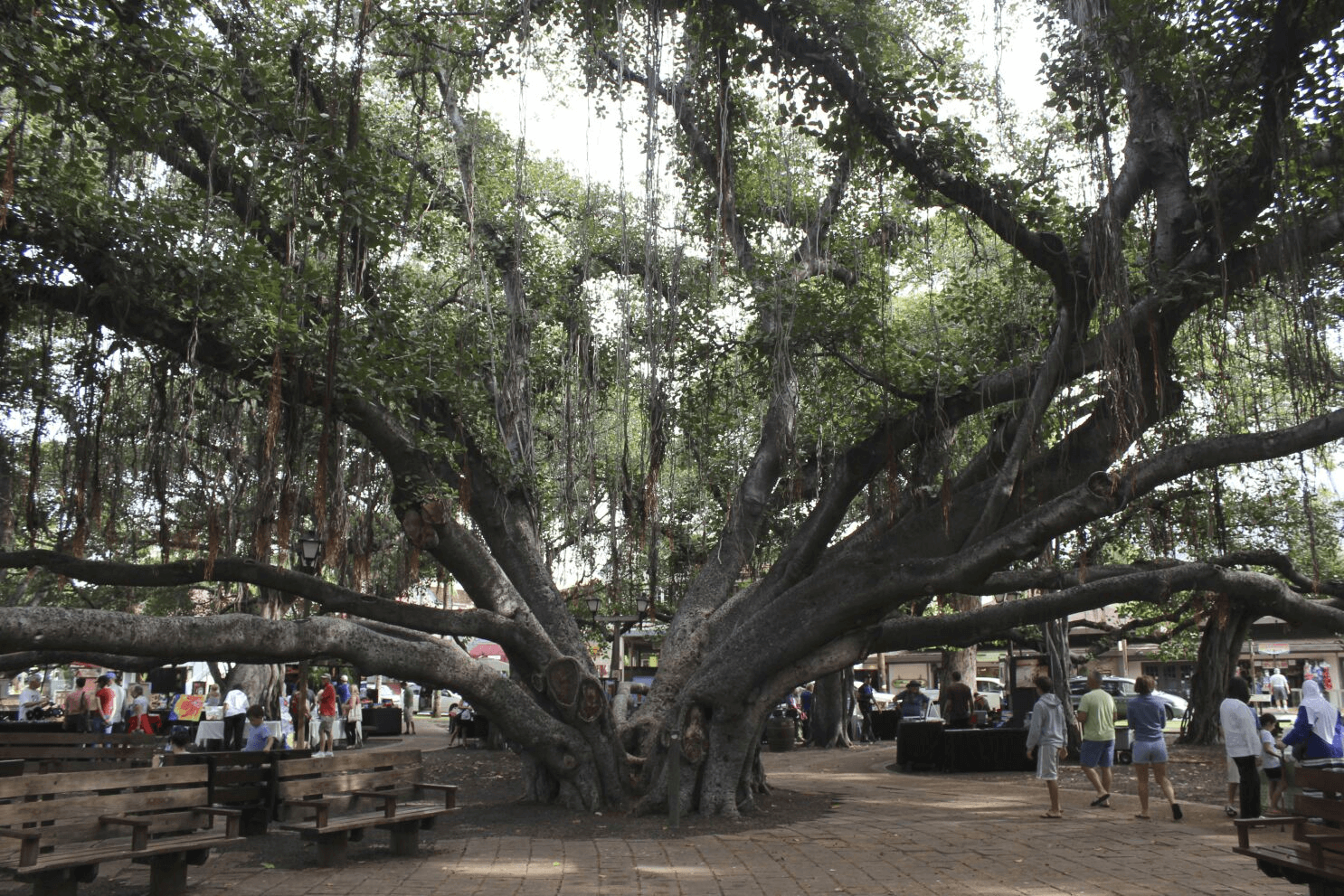Banyan trees in Hawaii are unique and different. They’re big and are hugely known for drawing attention, leaving many people curious about their roots and more. If you’ve come across this type of tree lately and have questions about it, you’re in the right place. In this article, we’ll delve into their origin, growth, and significance in Hawaii. Banyan trees hold special meaning on the islands. Originating from distant places and thriving in warm weather, Hawaiians admire and respect these trees. This article offers insights into Banyan trees in Hawaii. So let’s learn more about their origins, growth process, and importance.
What Makes Banyan Trees Unique?
Banyan trees in Hawaii stand out for their unique qualities. They are the world’s biggest trees when it comes to how much space they cover. An extraordinary example of this tree can be found in India, where a single Banyan tree spreads over a massive area, covering over 3 acres. This giant tree is capable of offering shelter to thousands of people underneath its branches. Banyan trees are also known for producing many figs, which serve as food for various types of birds and primates. In Hawaii, these remarkable trees possess unmatched significance due to their wide presence and their role in providing shelter and sustenance.
Origins And Journey Of Banyan Trees To Hawaii?
Even though you see Banyan trees a lot in Hawaii, they come from India. Missionaries from India brought them to the Hawaiian islands in 1873. Since then, these trees have become common in Hawaii, and they’re thought of as an important part of the islands.
Do Banyan Trees Grow In Hawaii’s Climate?
Yes, they do grow pretty well. Banyan trees adapt well to Hawaii’s climate. Their growth is influenced by warm and tropical conditions. These trees thrive in the Hawaiian environment due to the abundant sunlight and ample rainfall that the islands offer. The combination of warmth and moisture supports their growth, allowing them to spread their branches and roots widely.
Why Are Banyan Trees Often Called “Strangler Figs”?
Banyan trees are nicknamed “strangler figs” due to their growth style. They begin as epiphytes, leaning on other trees, and then gradually encircle and stifle the host tree. This process, akin to a “stranglehold,” leads to the Banyan tree‘s dominance.
Banyan Trees’ Adaptation to Hawaiian Environment?
According to an article published by Naples Zoo, the book Ficus by Ira Condit, the term Banyan is also used for any Fig that starts as an epiphyte, which is growing on another plant. You might know this as Strangler Fig. Today, most figs with many trunks are called Banyan trees. These trunks are actually aerial roots that grow down to the ground to support the tree. The number of roots can change based on species and place. More moisture might mean more roots, while less moisture leads to fewer roots.
Uses Of Banyan Trees?
Banyan trees Hawaii offer multiple uses. Traditional herbal medicine in India benefits from them. People find shelter under their branches. Additionally, the leaves serve as materials for making plates and wrapping food.
Are Banyan Trees In Hawaii Protected?
Yes, Banyan trees in Hawaii receive protection. Numerous Banyan Trees found in Kapiʻolani Regional Park are designated as Exceptional Trees, safeguarded under Act 105 by the Hawaiʻi State Legislature.
Famous Banyan Tree Spot In Hawaii
A notable Banyan tree spot in Hawaii is the Lahaina Banyan tree. Located in Lahaina, this Banyan tree is remarkable for its size and history. Planted on April 24, 1873, when it was just around 8 feet tall, it has grown to become one of the largest banyan trees in the United States and the largest banyan tree in Hawaii. This tree was brought in by Indian missionaries in Hawaii at that time. Right now, this tree covers an extensive area, making it a prominent attraction in Lahaina town. Visitors are drawn to its shade and the unique experience of standing beneath its impressive branches.
Where Do Banyan Trees Grow?
Banyan trees can be found in various places around the world, particularly in Pakistan, India, Nepal, Bangladesh, Bhutan, Sri Lanka, China, Taiwan, the Malay Archipelago, Mainland Southeast Asia, New Guinea, Australia, Ryukyu Islands, and New Caledonia.
Largest Banyan Tree In The World
The world’s biggest Banyan tree is in West Bengal. It’s called the Great Banyan. You can see it in the Acharya Jagadish Chandra Bose Botanical Garden, near Kolkata. This tree spans an area of 3.5 acres and is considered by many as one of the most notable trees on our planet.
Final Thoughts – Banyan Trees In Hawaii
Banyan trees hold a special place in Hawaii’s landscape and culture. Originating from India, these iconic trees arrived in Hawaii on April 24, 1873, and have been thriving in the warm climate ever since. They’re also often referred to as “strangler figs,” and their growth pattern is a testament to their adaptability.
These trees offer more than just visual grandeur; they have practical uses, from herbal medicine inspiration to shelter for many. As of writing this, the Lahaina Banyan tree stands as a living marvel in Hawaii and is the largest Banyan tree in America. On the other hand, the Great Banyan in West Bengal claims the title of the world’s largest.
As protected entities in Hawaii, Banyan trees exemplify nature’s beauty, resilience, and cultural significance, enriching both the Hawaiian landscape and our understanding of the world’s diverse plant life.

